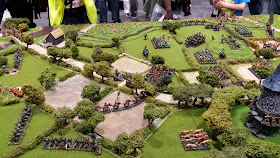If you've been keeping up with my blog posts for a while, you'll have seen that one tag I use to describe my painting projects is "Warhammer Sorta Thousand." In light of recent discussions about "what is Oldhamer?" I thought I'd say a few words about this idea -- what it is, what it means to me and why I'm into it.
Oldhammer and me
The Oldhammer Facebook group recently saw the need to crack down a little on off-topic discussion; nothing wrong with that, of course, but it means deciding what the topic actually is, which means defining the term. They chose to define Oldhammer as going up to 1992, which is fair enough, although personally I'd push it up a few years, but whatever. There are many definitions, but sometimes you have to pick one and go with it!
But Warhammer Sorta Thousand isn't
quite Oldhammer, although Oldhammer is a part of it. Let me ... hmmm.
Maybe the best way to illustrate this is visually.
 |
| Is it post-apocalyptic scumbags? |
 |
| The authentic 80s goodness? |
 |
| 21st century interpretations? |
 |
| Similar non-GW stuff? |
 |
| Pound shop toys? |
 |
| Classic sci-fi? |
 |
| Collecting things from the golden age? |
 |
| Obscure alternatives? |
 |
| DIY? |
 |
| RED WUNZ?! |
 |
| Modern models in "the tradition"? |
 |
| Plastic kitbashery? |
 |
| Rarities? |
The answer is yes!
A broad exploding church factory
For me, the thing that really appeals about the Rogue Trader era of Warhammer 40,000 is its potential. When you flip through the rulebook, you see everything from the
Mad Max-style post-apocalypse of Helsreach to table setups that look like much more traditional science fiction, and then of course the traditional space-Gothic greeblefest. And within the context of the loosely-defined Rogue Trader setting, it all makes sense. I mean, it doesn't make any sense. But you
expect that it won't make any sense.
I'm not some Rogue Trader purist -- the setting rapidly got developed with future releases, and I like a lot of what's in them. But the key to Warhammer Sorta Thousand is that you take that stuff and you mix it in as an inspiration to your own creativity rather than a set of rules you have to follow. So a lovingly-painted army of Ultramarines with every chapter marking in the right place and a bunch of more-or-less identical armoured vehicles is Warhammer, sure, but it doesn't quite fit Warhammer Sorta Thousand. Fundamentally, Warhammer Sorta Thousand is about
narrative gaming, and huge armies that make army-like sense don't necessarily fit that.
So the old-model and old-setting focus of Warhammer Sorta Thousand is not because I'm all about the 80s nostalgia, although God knows that's a factor, but because the older versions of the setting and models tended to support the types of scenarios that I want to play. But once you've accepted that premise, there's no need to limit yourself to a particular type or manufacturer of model.
I took these photos of a massive Warhammer 3rd edition game at Salute this year -- to me, they exemplify the Warhammer Sorta Thousand approach, albeit in fantasy form. You've got a wide range of different manufacturers in there -- including old GW, current GW, Reaper, 4A, Copplestone and many more. You've got cheapo monopose plastics, modern multiplart plastics, prepainted Conflix houses, metal originals, toys, you've got civilians and random monster encounters, you've got a story (although one that my photos don't tell well).
That's what I want from Warhammer Sorta Thousand -- and have never yet quite achieved.
Tl;dr




























I think you're in good company. And while I too love Cheetor's work, I think you're selling yourself short. You have some truly solid and splendid oldhammer there. Top to bottom and everything in between. I believe you are dead correct. The narrative is what makes the game interesting to me. It's a peculiar flavor that's very hard to describe. But I surely like your attempt.
ReplyDeleteWell, I think everyone's is going to be different, right? One of the things that I really like about the profusion of blogs is that you can see so many different varieties and what makes each of them work -- and, in the spirit of the thing, swipe the things you like. Same thing I like about the DIY D&D community.
DeleteOh, absolutely. Everyone does it just a little differently. When it works we can all agree and put miniatures on the table together and create a unique hybrid of our joint visions. And there's often some similarity. A great deal, even. But yes, we all do it just a little differently and that's okay.
Delete